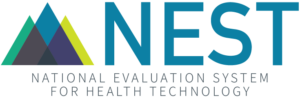Conversation with the NESTcc Governing Committee Member: Vance Moore
 “I am constructively dissatisfied, meaning that I always ask, ‘what would it take to be a little bit better than where we are now?’ I am highly motivated by the greater good of healthcare and believe that we can truly obtain real world evidence that will help us make better decisions on all fronts.”
“I am constructively dissatisfied, meaning that I always ask, ‘what would it take to be a little bit better than where we are now?’ I am highly motivated by the greater good of healthcare and believe that we can truly obtain real world evidence that will help us make better decisions on all fronts.”
Vance Moore
President of Business Integration at Mercy
NESTcc Governing Committee Member
Vance Moore is a creator and connector. He consistently seeks new ways to improve processes and communication in healthcare, previously in industry and now representing health systems.
At Mercy, Vance heads efforts to collect Real-World Data (RWD) from Mercy’s 40-hospital network in care environments ranging from a 20-bed critical care center in a small town to the 37th largest hospital in the nation. With that RWD, Mercy generates Real-World Evidence (RWE) to use internally and in partnership with manufacturers and other interested ecosystem stakeholders.
Health systems face a unique set of internal and external challenges in generating and applying RWE, according to Vance.
Internally, they must build a robust infrastructure of people, processes, and technology for ensuring data integrity and completeness. Even with tight standards for data collection in place, unexpected challenges in data aggregation and analysis can surface even when the data are accurate. For example, physicians may only enter patient data in half of their encounters or the definition of operating room start time may vary across sites. Health systems must be able to account for nuances like these to be confident in their decisions to use the data or discard it, Vance said.
Externally, health systems must consider the legal obligations and liabilities associated with releasing information and develop strategic partnerships to realize the true value of their RWD.
“While it used to be ‘my data is my data only’, today we are collaborating more. We are beginning to compare data so that we can learn from each other and improve ourselves overall. But it’s still an effort and we need help to both facilitate and broaden the scope of these collaborations,” Vance said.
Vance sees NESTcc as a matchmaking organization that can improve the outcomes of data partnerships for all involved. NESTcc’s third-party role, as well as its future data quality standards for Network Collaborators and methods standards for observational and randomized studies, will offer assurance of high-quality RWD and RWE. He envisions that partnerships with NESTcc could increase both the speed to market for industry and the speed to issue resolution for health systems.
NESTcc will not only facilitate better data partnerships, but it may also – through the diverse perspectives assembled within the Governing Committee – facilitate better understanding amongst all participants in the ecosystem.
“I am intrigued by the diversity of those around the table in the Governing Committee. I don’t see many other groups composed in this way and believe that the convergence of several unique perspectives will help us use information and collaboration to solve some of healthcare’s problems. Because of our diversity, I also believe we have a chance to break barriers and misconceptions about the different stakeholders of the ecosystem, first within the Committee and eventually within the entire community. Developing a deeper understanding of who we are and what drives us may illuminate new pathways toward our goals,” he said.
How Health Systems Can Help Support the Efforts of NESTcc
NEST’s potential to change the way we solve healthcare challenges is part of the reason Mercy agreed to become a NESTcc Network Collaborator.
As a Network Collaborator, Mercy is participating in a NESTcc Demonstration Project to develop, test, and validate the use of an electronic health records (EHR)-based data network to support evidence generation for medical devices across the total product life cycle (TPLC). Mercy is also part of the small-scale launch of the NESTcc Data Network, currently a group of 11 organizations representing 150 hospitals and 3,042 outpatient clinics, with data representing more than 469 million patient records. This spring, the NESTcc Network Collaborators will participate in the first test-cases for NESTcc. These test-cases will evaluate their abilities to capture the data needed to support a range of studies and analyses for industry stakeholders.
Vance’s pitch to encourage health systems to engage with NESTcc is that in doing so they can go “faster and deeper” than what they are capable of today in terms of interrogating RWD and generating RWE.
“NESTcc’s structure enables data partners to essentially pre-engineer their offerings to better address stakeholder pain points. You can work with each stakeholder to find out what they need from a data perspective and what you can get them that they’re not getting today. Pre-engineering helps you deliver a better product faster. Because you have NESTcc as a third-party manager, you have access to deeper levels of knowledge and deeper networks for building collaborations than you would have had on your own,” he said.
He believes that health systems already collect the information that will lead to care improvements within their own networks. But, engaging with NESTcc and collaborating to improve care for all can help health systems gain new insight, build new relationships, and attract and retain great talent interested in making a difference in healthcare.
“We all have pieces of the story, but none of us have the complete story. Ideally, I would love to see the big industry issues with which we are struggling find their way to NEST, so that manufacturers, payers, health systems, researchers, and patients can come together to improve our processes and solve these problems,” he said.
Related Links
Get to know the NESTcc Demonstration Projects
Meet the NESTcc Network Collaborators
Learn more about the industry test-cases and other opportunities for engagement with NESTcc
Read Executive Director Rachael Fleurence’s blog on 2018 plans for NESTcc
This blog was written by Marina Damiano, Ph.D., as a contributing member of the NESTcc communications team.
